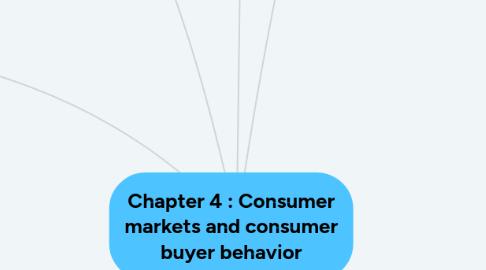
1. Type of buying decision behavior
1.1. -high involvement-purchase lead to more active,careful decision making
1.2. -low involvement-most purchase are not highly involving
1.3. -4 type of buying behavior
1.3.1. -complex buying-highly involve in purchase and perceive significant differences among brands
1.3.2. -variety seeking-low consumer involvement but significant perceived brand differences
1.3.3. -dissonance-reducing-highly involve with an expensive, infrequent or risky purchase, but see little differences among brand
1.3.4. -habitual-low consumer involvement and little significant brand differences
2. Model of consumer behavior
2.1. Environmental stimuli
2.1.1. 4'Ps-Product,Price,Place,Promotion
2.2. Consumer black box
2.2.1. 2 Parts-Buyer's characteristic and Buyer's decision process
2.3. Consumer responses
2.3.1. Purchasing and loyalty to the brand or outlet
3. Characteristics affecting consumer behavior
3.1. Cultural influences
3.1.1. Subculture
3.1.1.1. -Nationalities, religions,racial group and geographic regions
3.1.2. Culture
3.1.2.1. -Reflects the learned value,perception,wants'and behavior
3.1.3. Social class
3.1.3.1. -Measure by a combination of occupation, income,education,wealth and other variables
3.2. -online communication where people socialize or exchange information and opinion
3.3. Social factors
3.3.1. -group /opinion leaders
3.3.2. -family
3.3.3. -roles
3.3.4. -status
3.4. Group and social network
3.4.1. -Membership
3.4.2. -Aspirational
3.4.3. -References
3.5. Opinion leadership
3.5.1. - leading adopters
3.5.2. -use as brand ambassador
3.6. Opinion leaders and social networks
3.6.1. -online social networks
3.7. Family
3.7.1. family buying roles-involve husband and wife
3.7.2. -family buying influences
3.7.2.1. -impact on children in decision making
3.7.2.2. -roles and status
3.7.2.3. -personal influences
3.7.2.4. -age/lifecycle
3.7.2.5. -occupation
3.7.2.6. -economic situation
3.7.2.7. lifestyle/AIOs
3.7.2.8. -VALS Lifestyle clasification
3.7.2.9. -personality and self-concept
3.8. Psychological factor
3.8.1. -motivation-Maslow'S Hierarchy of needs
3.8.2. -perception-select, organize and interpret
3.8.3. -learning-drives,stimuli,cues,responses and reinforcement
3.9. -Beliefs and attitudes
4. The buyer decision process for new product
4.1. -stages in adoption process
4.1.1. 1.awareness
4.1.2. 2.interest
4.1.3. 3.evaluation
4.1.4. 4.trial
4.1.5. 5.adoption
5. The buyer decision process
5.1. -the buyer decision process
5.1.1. 1.need reconition
5.1.2. 2. search
5.1.3. 3.information sources
5.1.4. 4. alternative evaluation
5.1.5. 5.purchase
5.1.6. 6.post-purchase
5.1.7. 7.cognitive dissonance
5.1.8. 8.customer satisfaction
